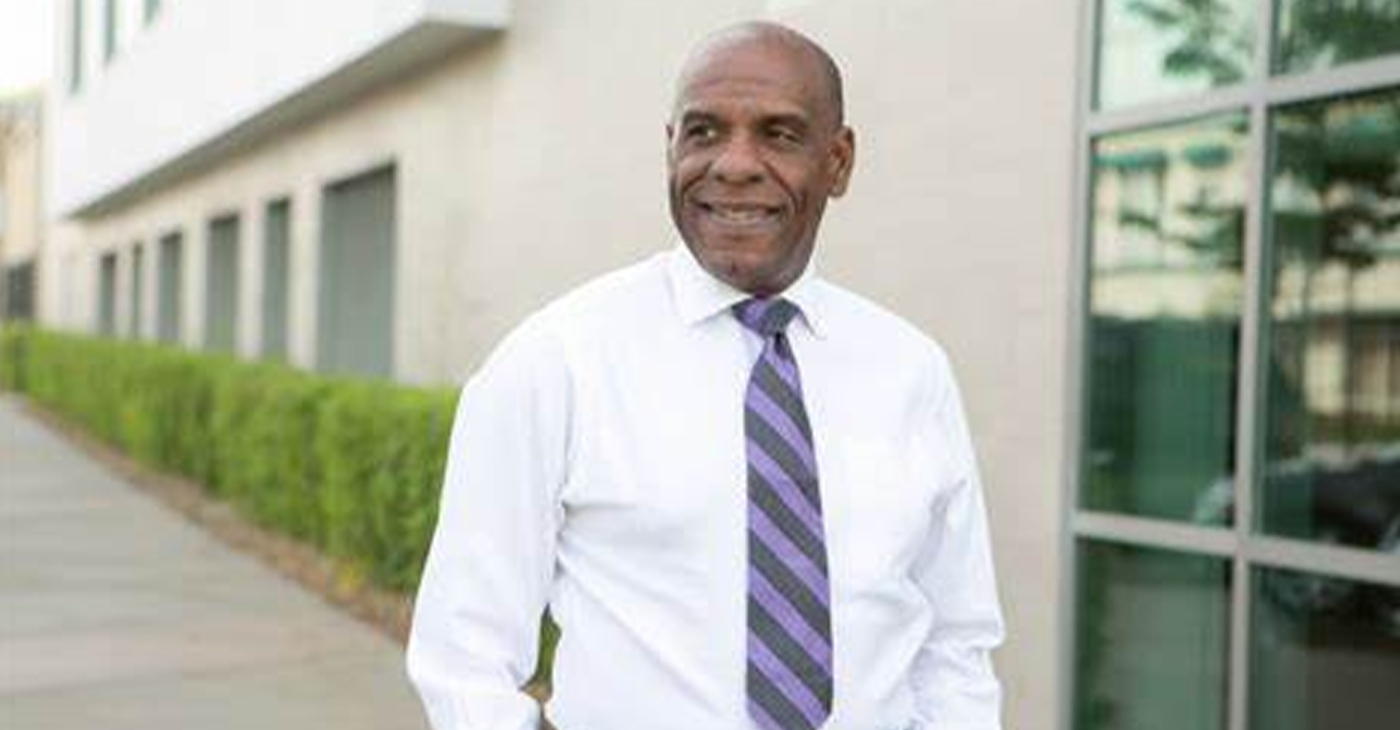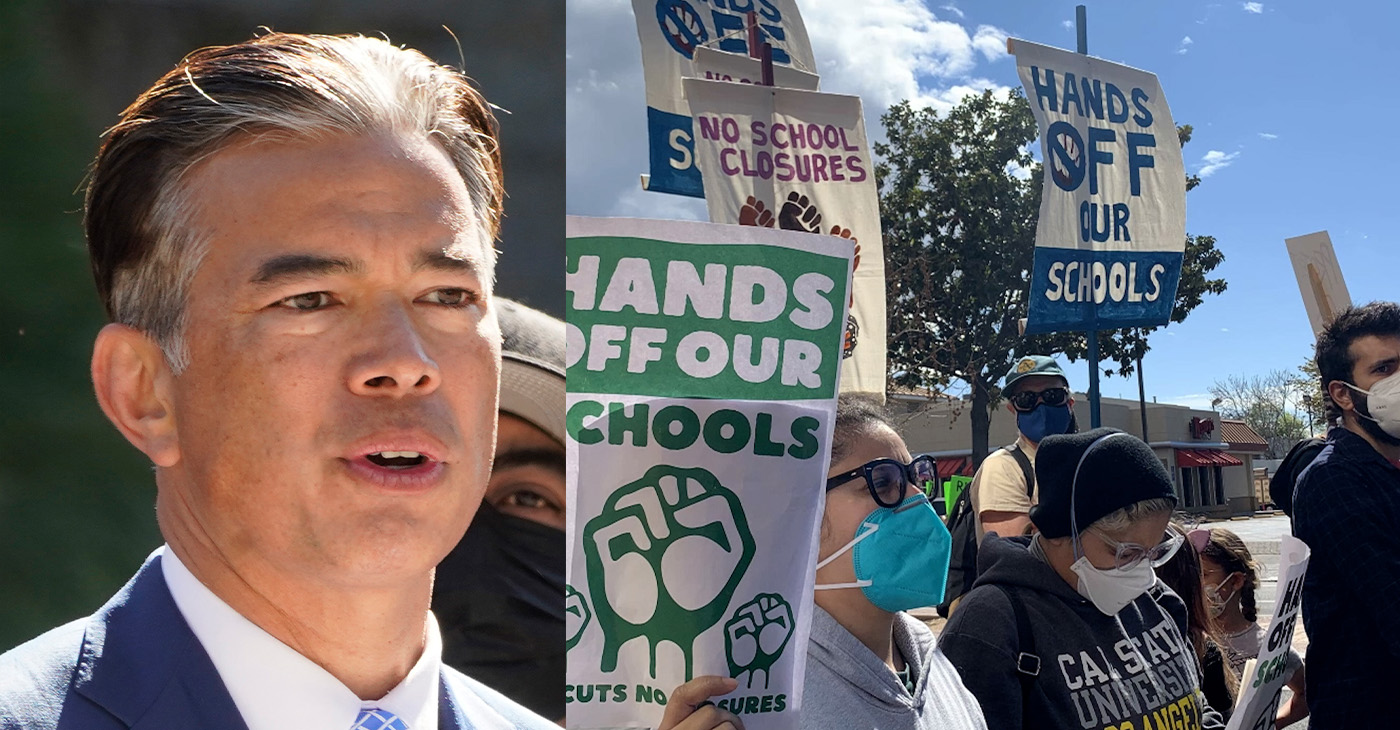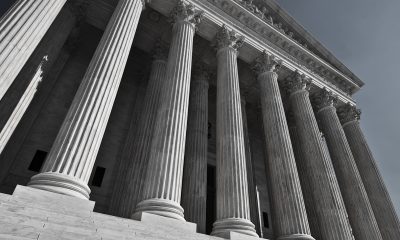Politics
Q&A: Issues, Possible Legal Outcomes in Gay Marriage Cases

In this June 26, 2013, file photo, Sean Lewrence, of Philadelphia, holds up a flag during a rally for gay marriage, on Independence Mall in Philadelphia. A federal appeals court on Thursday, Nov. 6. 2014, upheld anti-gay marriage laws in four states, breaking ranks with other courts that have considered the issue and setting up the prospect of Supreme Court review. (AP Photo/Matt Slocum, File)
Mark Sherman, ASSOCIATED PRESS
WASHINGTON (AP) — Just two years ago, the Supreme Court struck down part of the federal anti-gay marriage law that denied a range of government benefits to legally married same-sex couples.
The decision in United States v. Windsor did not address the validity of state marriage bans, but courts across the country, with few exceptions, said its logic compelled them to invalidate state laws that prohibited gay and lesbian couples from marrying.
The number of states allowing same-sex marriage has grown rapidly. As recently as October, just over one-third of the states permitted same-sex marriage. Now, same-sex couples can marry in 36 states and the District of Columbia. A look at what is now before the Supreme Court, and the status of same-sex marriage around the country:
___
WHAT’S LEFT FOR THE SUPREME COURT TO DO AMID ALL THIS CHANGE?
The justices on Tuesday are hearing extended arguments, scheduled to run 2½ hours, in highly anticipated cases about the right of same-sex couples to marry. The cases before the court come from Kentucky, Michigan, Ohio and Tennessee, all of which had their marriage bans upheld by the federal appeals court in Cincinnati in November. That appeals court is the only one that has ruled in favor of the states since the 2013 Windsor decision.
___
WHAT’S AT STAKE?
Two related issues would expand the marriage rights of same-sex couples. The bigger one: Do same-sex couples have a constitutional right to marry or can states continue to define marriage as the union of a man and a woman? The second: Even if states won’t allow some couples to marry, must they recognize valid same-sex marriages from elsewhere?
___
WHAT ARE THE MAIN ARGUMENTS ON EACH SIDE?
The arguments of marriage-rights supporters boil down to a claim that states lack any valid reason to deny the right to marry, which the court has earlier described as fundamental to the pursuit of happiness. They say state laws that allow only some people to marry violate the Constitution’s guarantee of equal protection under the law and make second-class citizens of same-sex couples and their families. Same-sex couples say that preventing them from marrying is akin to a past ban on interracial marriage, which the Supreme Court struck down in 1967.
The states respond that they have always set the rules for marriage and that voters in many states have backed, sometimes overwhelmingly, changes to their constitutions to limit marriage to a man and a woman. They say a lively national debate is underway and there is no reason for courts to impose a solution that should be left to the political process. The states also argue that they have a good reason to keep defining marriage as they do. Because only heterosexual couples can produce children, it is in the states’ interest to make marriage laws that encourage those couples to enter a union that supports raising children.
___
IS THE OBAMA ADMINISTRATION PLAYING A ROLE?
The administration is backing the right of same-sex couples to marry, although its argument differs in one respect. The plaintiffs say that the state laws should fall, no matter what standard the court applies. The administration calls for more rigorous scrutiny than courts ordinarily apply to most laws, saying it is appropriate when governments discriminate against a group of people. That already is the case for claims that laws discriminate on the basis of race, sex and other factors. But the administration is silent about what the outcome should be if the court does not give gays the special protection it has afforded women and minorities.
The Justice Department’s decision to stop defending the federal anti-marriage law in 2011 was an important moment for gay rights, and President Barack Obama declared his support for same-sex marriage in 2012.
___
WHAT HAPPENS IF THE COURT STRIKES DOWN THE STATE BANS?
A ruling that same-sex couples have a right to marry would invalidate the remaining anti-gay marriage laws in the country. If the court limits its ruling to requiring states to recognize same-sex unions, couples in states without same-sex marriage presumably could get married elsewhere and then demand recognition at home.
___
WHAT HAPPENS IF THE COURT RULES FOR THE STATES ON BOTH QUESTIONS?
The bans in 14 states would survive. Beyond that, confusion probably would reign. Some states that had their marriage laws struck down by federal courts might seek to reinstate prohibitions on gay and lesbian unions. Questions also could be raised about the validity of some same-sex weddings. Many of these problems would be of the Supreme Court’s own making.
___
WHY IS THAT?
From October to January, the justices first rejected appeals from states seeking to preserve their marriage bans, then allowed court rulings to take effect even as other states appealed those decisions. The result is that the court essentially allowed the number of states with same-sex marriage to double.
___
WHERE IS SAME-SEX MARRIAGE LEGAL?
Same-sex couples can marry in 36 states, the District of Columbia and parts of Missouri. More than 500 marriage licenses were issued to same-sex couples in Alabama this year after a federal court struck down the state’s ban. But probate judges have not issued any more licenses to gay and lesbian couples since the Alabama Supreme Court ordered a halt to same-sex unions in early March.
Gay and lesbian couples may not marry in Alabama, Arkansas, Georgia, Kentucky, Louisiana, Michigan, Mississippi, most of Missouri, Nebraska, North Dakota, Ohio, South Dakota, Tennessee and Texas.
___
HOW MANY MARRIED SAME-SEX COUPLES ARE THERE IN THE U.S.?
Gary Gates, an expert at UCLA’s Williams Institute on the demography of gays and lesbians in the U.S., estimated that there were 350,000 married same-sex couples as of February. Gates relied on Gallup Inc. survey data and Census Bureau information to arrive at his estimate. That’s just 0.3 percent of the nation’s 242 million adults, Gates said. Almost as many same-sex couples are unmarried, Gates said.
___
WHAT ARE THE NEXT ISSUES FACING GAY RIGHTS?
One fight in the news this year is over efforts to carve out religious exemptions for people and institutions that object to same-sex marriage. It is clear that churches do not have to marry same-sex couples if doing so violates their religious tenets, but what about county clerks? Can photographers refuse to shoot same-sex weddings? Can bakers decline to bake a cake for two men? Civil rights groups say they will continue pressing for other protections from discrimination against LGBT people in employment and housing, among other areas. Even if same-sex couples win the right to marry everywhere, people still can be fired because of their sexual orientation in more than half the states.
___
Online:
Supreme Court: http://www.supremecourt.gov
Follow Mark Sherman on Twitter at: http://www.twitter.com/shermancourt.
Copyright 2015 The Associated Press. All rights reserved. This material may not be published, broadcast, rewritten or redistributed.
###
Barbara Lee
Congresswoman Barbara Lee Issues Statement on Deaths of Humanitarian Aid Volunteers in Gaza
On April 2, a day after an Israeli airstrike erroneously killed seven employees of World Central Kitchen (WCK), a humanitarian organization delivering aid in the Gaza Strip, a statement was release by Rep. Barbara Lee (D-CA-12). “This is a devastating and avoidable tragedy. My prayers go to the families and loved ones of the selfless members of the World Central Kitchen team whose lives were lost,” said Lee.

By California Black Media
On April 2, a day after an Israeli airstrike erroneously killed seven employees of World Central Kitchen (WCK), a humanitarian organization delivering aid in the Gaza Strip, a statement was release by Rep. Barbara Lee (D-CA-12).
“This is a devastating and avoidable tragedy. My prayers go to the families and loved ones of the selfless members of the World Central Kitchen team whose lives were lost,” said Lee.
The same day, it was confirmed by the organization that the humanitarian aid volunteers were killed in a strike carried out by Israel Defense Forces (IDF). Prior to the incident, members of the team had been travelling in two armored vehicles marked with the WCF logo and they had been coordinating their movements with the IDF. The group had successfully delivered 10 tons of humanitarian food in a deconflicted zone when its convoy was struck.
“This is not only an attack against WCK. This is an attack on humanitarian organizations showing up in the direst situations where food is being used as a weapon of war. This is unforgivable,” said Erin Gore, chief executive officer of World Central Kitchen.
The seven victims included a U.S. citizen as well as others from Australia, Poland, the United Kingdom, Canada, and Palestine.
Lee has been a vocal advocate for a ceasefire in Gaza and has supported actions by President Joe Biden to airdrop humanitarian aid in the area.
“Far too many civilians have lost their lives as a result of Benjamin Netanyahu’s reprehensible military offensive. The U.S. must join with our allies and demand an immediate, permanent ceasefire – it’s long overdue,” Lee said.
Community
Financial Assistance Bill for Descendants of Enslaved Persons to Help Them Purchase, Own, or Maintain a Home
California Legislative Black Caucus (CLBC) vice chair Sen. Steven Bradford (D-Inglewood) introduced new legislation related to reparations to the Senate Committee on Housing on April 2 in Sacramento. Senate Bill (SB) 1007, “establishes the Homeowner’s Assistance for Descendants of Enslaved Persons Program to make financial aid or assistance available to descendants for the purposes of purchasing, owning, or maintaining a home,” the legislation states.

California Legislative Black Caucus (CLBC) vice chair Sen. Steven Bradford (D-Inglewood) introduced new legislation related to reparations to the Senate Committee on Housing on April 2 in Sacramento.
Senate Bill (SB) 1007, “establishes the Homeowner’s Assistance for Descendants of Enslaved Persons Program to make financial aid or assistance available to descendants for the purposes of purchasing, owning, or maintaining a home,” the legislation states.
The Senate Housing Committee advanced the bill with an 8-1 vote. It will be re-referred to the Appropriations Committee for consideration.
Sen. Kelly Seyarto (R-Murrieta) was the only member who voted against the bill.
“SB 1007 is about starting a long process of paying back a debt that is not only owed, but that was also promised, and is 160 years overdue, to African Americans,” Bradford told the committee chaired by Sen. Nancy Skinner (D-Berkeley). “It is the first step in closing the wealth and equity gap created by centuries of slavery and racial discrimination policies.”
The bill aligns with one of the 115 recommendations listed in a two-year study conducted by the California reparations task force, of which Bradford was one of nine members.
Bradford said the report reveals that, in the state of California, a typical Black-owned home is 22% less valuable than a White-owned home.
Various advocacy groups from around the state attended the hearing held at the State Capitol Annex Swing Space. The California Housing Partnership, Bay Area Regional Health and Inequities Initiative, Coalition for A Just and Equitable California, Disability Rights of California, the American Civil Liberties Union of California, and California Community Builders all voiced their support of the bill.
Community
AG Bonta Says Oakland School Leaders Should Comply with State Laws to Avoid ‘Disparate Harm’ When Closing or Merging Schools
California Attorney General Rob Bonta sent a letter this week to the Oakland Unified School District (OUSD) Board of Education saying the district has a duty to comply with state education and civil rights laws to protect students and families from “disparate harm,” such as segregation and discrimination, if the district goes ahead with school closures, mergers or consolidations in 2025-2026.

AG Bonta said DOJ investigation of 2022 closure decisions would have negatively impacted Black and low-income families.
By Post Staff
California Attorney General Rob Bonta sent a letter this week to the Oakland Unified School District (OUSD) Board of Education saying the district has a duty to comply with state education and civil rights laws to protect students and families from “disparate harm,” such as segregation and discrimination, if the district goes ahead with school closures, mergers or consolidations in 2025-2026.
The letter and an accompanying media release announced the findings of the California Department of Justice’s (DOJ) investigation into the OUSD Board’s Feb. 8, 2022, decision to close Parker Elementary, Brookfield Elementary, Carl B. Munck Elementary, Fred T. Korematsu Discovery Academy, Grass Valley Elementary, Horace Mann Elementary, and Community Day School and eliminate grades 6-8 of Hillcrest Elementary and La Escuelita Elementary.
“All school districts and their leadership have a legal obligation to protect vulnerable children and their communities from disparate harm when making school closure decisions,” said Attorney General Bonta.
“The bottom line is that discrimination in any form will not be tolerated,” he said. “I am committed to working with OUSD’s leadership to achieve successful outcomes for students.
“My office will continue to monitor OUSD’s processes and decision-making as it moves forward with the required community engagement, equity impact analysis, and planning to implement any future closures, mergers, or consolidations” to ensure compliance with California’s Constitution, AB 1912, and anti-discrimination laws.
By press time, the school district did not respond to a request for comment from OUSD.
The DOJ’s findings showed that the February 2022 decision, later partially rescinded, would have disproportionately impacted Black and low-income elementary students, as well as high-need students with disabilities, according to the media release.
The Attorney General outlined concerns about criteria OUSD has announced that it may rely on to determine future closures, mergers, and consolidations and provided recommendations to ensure OUSD does not violate state law, including prohibitions against closure decisions that reinforce school segregation or disproportionately impact any student group as required by the State Constitution, AB 1912, and anti-discrimination laws.
According to AB 1912, passed in September 2022, financially distressed school districts contemplating school closures, mergers, or consolidations must engage the community before closing schools; conduct an equity impact assessment; and provide the public with the set of criteria the district plans to utilize to make decisions.
In the letter, DOJ identified a “problematic” approach to planning for closing schools in 2025-2026 and “strongly recommends” steps OUSD should take going forward.
- “Take affirmative steps to ensure that its enrollment and attendance boundary and school closure decisions alleviate school segregation and do not create disproportionate transportation burdens for protected subgroups.”
- Don’t solely utilize criteria such as school facilities’ conditions, school operating costs, and school capacity without also including an assessment of past and present inequities in resources “due to educational segregation or other causes.”
- Some of OUSD’s proposed guidelines “may improperly penalize schools serving students with disabilities and students who have high needs.”
- The district’s decisions should also include “environmental factors, student demographics and feeder attendance patterns, transportation needs, and special programs.”
- Avoid overreliance on test scores and other quantitative data without also looking at “how each school is serving the needs of its specific student body, especially as it relates to historically marginalized communities.”
- “Engage an independent expert to facilitate community input and equity impact.”
The letter also emphasized that DOJ is willing to provide “feedback and consultation at any time during the process to ensure that OUSD’s process and outcomes are legally compliant and serve the best interests of the school community and all of its students.”
-

 Activism4 weeks ago
Activism4 weeks agoOakland Post: Week of March 20 – 26, 2024
-

 #NNPA BlackPress3 weeks ago
#NNPA BlackPress3 weeks agoCOMMENTARY: D.C. Crime Bill Fails to Address Root Causes of Violence and Incarceration
-

 #NNPA BlackPress3 weeks ago
#NNPA BlackPress3 weeks agoMayor, City Council President React to May 31 Closing of Birmingham-Southern College
-

 #NNPA BlackPress3 weeks ago
#NNPA BlackPress3 weeks agoCOMMENTARY: Lady Day and The Lights!
-

 #NNPA BlackPress3 weeks ago
#NNPA BlackPress3 weeks agoFrom Raids to Revelations: The Dark Turn in Sean ‘Diddy’ Combs’ Saga
-

 #NNPA BlackPress3 weeks ago
#NNPA BlackPress3 weeks agoBaltimore Key Bridge Catastrophe: A City’s Heartbreak and a Nation’s Alarm
-

 #NNPA BlackPress3 weeks ago
#NNPA BlackPress3 weeks agoBaltimore’s Key Bridge Struck by Ship, Collapses into Water
-

 Activism3 weeks ago
Activism3 weeks agoOakland Post: Week of March 27 – April 2, 2024










































